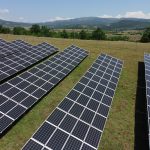Transitioning to climate neutrality requires bold long-term investments in clean energy infrastructure. And public and private investments into energy efficiency and renewable energy are key to ensuring a sustainable economic recovery out of the current crisis. However, a new report shows how little EU countries use existing EU regional development funds for this purpose. With the EU budget best placed to support the sustainable economic recovery, Member States must make climate action a much bigger priority of future EU funds spending.
EU member states have been dragging their feet when it comes to backing their climate pledges with adequate investments stemming from EU Regional Development and Cohesion Funds, the new report “Funding climate and energy transition in the EU: the untapped potential of regional funds” reveals. With only 9.7% of current EU funds for the period 2014-2020 mobilised to finance clean energy infrastructure EU Member States must urgently review the way they spend the future 2021-2027 EU budget if they are serious about achieving climate neutrality in practice while rolling-out long-term investments which can stimulate the sustainable economic recovery[1].
The economic support measures currently being developed and discussed are much needed in the fight against the health and economic crisis provoked by the coronavirus. But once the basic functioning of our economies will be restored, EU countries will have to make long-term investment plans which should put the transition to climate neutrality at its heart. In particular, the EU funds spending plans – so-called Operational Programmes – that are currently being drafted are key to steering regional development investments towards the EU’s climate objectives.
Markus Trilling, Finance and Subsidies Policy Coordinator at Climate Action Network (CAN) Europe said:“ Targeted investments in the fight against climate change would contribute to the European recovery. For this, future EU funds must prioritise infrastructure investments that catalyse the decarbonisation of all sectors of the economy, such as renewable energy from wind and solar, energy efficiency and sustainable mobility and agriculture. This will bring the long-term sustainable economic stimulus making our societies resilient towards future shocks.”
“As EU leaders are deciding now how they will spend the next generation of EU funds, they must put the money where their mouth is. To reach the agreed climate neutrality goal, EU governments must urgently redirect EU funds to climate action, and away from fossil fuels. Doing so is the best way to boost the recovery of European economies.”
Some Central and Eastern European countries – who are among the main beneficiaries of EU funds – claim they need more financial help from the EU purse in return for committing to higher climate goals. The report finds that current spending does not match their words. Poland has spent only 7.7% of its EU regional funding (ERDF and CF) on clean energy infrastructure, making the country the EU’s fourth-worst spender after Slovakia (6.6%), Bulgaria (6.7%) and Croatia (7%).
Miljenka Kuhar, senior policy expert at Croatian NGO, DOOR – Society for Sustainable Development Design, said: “As the current programming period was the first in which Croatia participated as a Member State, results achieved at the end of 2019 only reflect its inexperience and under-preparedness for the absorption of EU funds. It is unfortunate that those who could benefit the most from EU funds are the ones who were actually affected the most by the lack of Government preparedness to open and implement the calls in time. Citizens who were expecting to receive grants for energy renewal of their homes, researchers who expected to receive grants to research climate change and industry and SMEs who supposed to benefit more for investment in RES have unfortunately been let down. As we are facing a current health and economic crisis, we can just hope that Croatia will do better in the next period from 2021-2027 and that this crisis helped all of us to set our priorities straight and to realize that if we want a better and healthier future we need to invest more in the climate today.“
Taj Zavodnik, policy expert at Slovenian NGO, FOCUS, said: “EU funds are the main source of investment in Slovenia. However, the data shows that in the current budget period, Slovenia did not seize the opportunity to prioritize all available resources for sustainable development and clean energy transition. When planning the use of EU funds for the period 2021-2027, which will be a crucial period for economic recovery after the COVID-19 and to address the climate crisis, Slovenian government should maximize the use of EU funds for implementation of NECP measures estimated at 28.386 million EUR. Investing in sustainable mobility, energy efficiency in residual buildings, solar energy production, storage and transmission would create a better future for all of us. “
Contributing to the economic recovery, the next EU budget 2021-2027 must increase its focus on climate action far more than today, dedicating 40% to climate action. It must ensure more support to energy efficiency and renewable energy projects, housing and mobility. This is needed to allow the EU, and particularly its lesser developed regions, to implement the climate neutrality objective that EU heads of state and government agreed last year, and for the bloc to achieve a new, substantially increased 2030 climate target.
ENDS
CONTACT:
Goksen Sahin, Communications Coordinator, goksen@caneurope.org, +32 468 45 39 20
NOTES TO THE EDITOR:
[1] European Regional Development Fund (ERDF) and Cohesion Fund (CF) of the EU 27 in 2014 -2020, planned amounts for renewable energy, energy efficiency, electricity infrastructure and research and innovation for climate action;
data reported for 2019; source: own calculation based on ‘Categories of Intervention’, https://cohesiondata.ec.europa.eu; data retrieved 3 March 2020
[2]Report is available here



